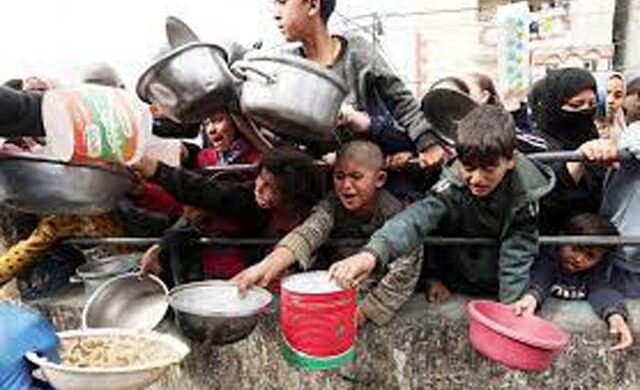
The world’s top court ordered Israel Thursday to “ensure urgent humanitarian assistance” reaches Gazans, as warnings multiplied of imminent famine after nearly six months of relentless conflict.
Heavy fighting and sustained bombardment again rocked the territory despite the UN Security Council’s adoption of a resolution earlier this week demanding an “immediate ceasefire”.
“Israel shall… take all necessary and effective measures to ensure, without delay… the unhindered provision… of urgently needed basic services and humanitarian assistance,” the International Court of Justice said in its ruling.
This included food, water, electricity, fuel, shelter, clothing, hygiene and sanitation requirements, as well as medical supplies and medical care to Palestinians throughout Gaza, its judges said.
“Palestinians in Gaza are no longer facing only a risk of famine, but… famine is setting in,” the Hague-based court said.
South Africa had asked the court to bolster a previous order it issued in January for Israel to allow aid into Gaza to take account of the further deterioration of the situation on the ground.
The United Nations has warned that famine “is ever closer to becoming a reality in northern Gaza”, and said Gaza’s health system is collapsing “due to ongoing hostilities and access constraints”.
While the war has turned much of the territory into a devastated wasteland, Israel has also imposed a siege on its 2.4 million people, eased only by occasional aid deliveries. With clean water also scarce, Gazans were queueing to fill plastic containers from a tank west of Rafah city.
“We have to queue for everything,” said one displaced woman, Maram Abu Amra. “We walk for an hour in total. Sometimes, we return empty-handed, without water.”
– Fighting around Gaza hospitals –
The Israeli army reported heavy fighting near the Al-Amal Hospital in Gaza’s main southern city of Khan Yunis in which its troops had killed dozens of Hamas and recovered hundreds of weapons.
Across Gaza, Israel’s military said it had struck dozens of targets over the previous day while the health ministry in the Hamas-run territory reported 62 more deaths.
Israel says Hamas and Jihads have fought from inside Gaza hospitals, using patients, medical staff and displaced people for cover — charges the Palestinian Hamas groups have denied.
Israel said its soldiers near Al-Amal had carried out “targeted raids on terrorist infrastructure … and are eliminating dozens of terrorists using precise fire in close-quarters combat and with air support”.
They had also “apprehended dozens of terrorists in the area who were transferred for interrogations”, the army added.
Israeli tanks and armoured vehicles have also massed around another Khan Yunis health facility, the Nasser Hospital, but had not yet staged a full-scale raid, the Gaza health ministry said.
Fighting has also rocked the Gaza City district around Al-Shifa Hospital, the territory’s biggest, where the army says it has killed around 200 Hamas since early last week.
Local resident Abed Radwan, 63, said he had to flee when “Israeli forces stormed all buildings and homes in the Al-Rimal area, arrested several people and forced the rest to walk south”.
“I walked with them,” he said. “I saw many decomposing bodies in the streets and several houses flattened. They left nothing intact, they destroyed everything.”
The war began with Hamas’s October 7 attack that resulted in about 1,160 deaths in Israel, mostly civilians, according to an AFP tally based on Israeli official figures.
The Hamas also took about 250 hostages. Israel says about 130 captives remain in Gaza, including 34 presumed dead.
Israel’s retaliatory campaign has killed at least 32,552 people, mostly women and children, according to Gaza’s health ministry.
– US talks on Rafah –
Israeli Prime Minister Benjamin Netanyahu appeared to be trying to soothe a rift with US President Joe Biden with plans to send a government delegation to Washington after earlier cancelling the trip.
“The prime minister’s office has said they’d like to reschedule the meeting,” said a US senior administration official, speaking on condition of anonymity and adding that they were setting a new date.
Tensions flared after Washington abstained in Monday’s vote at the United Nations, rather than using its veto on the Security Council to block the resolution as it had with previous demands for an “immediate ceasefire”.
Netanyahu charged that the US move served to embolden Israel’s enemy Hamas whose October 7 attack sparked the deadliest ever Gaza war.
US concern has mounted over Israeli plans to push its ground offensive into Rafah, Gaza’s southernmost city which is packed with some 1.5 million people, most of them displaced from other parts of the territory.
US officials say they want to present Israel with an alternative plan for Rafah, focused on striking Hamas targets while limiting the civilian toll.
Israeli Defence Minister Yoav Gallant had “constructive discussions” in Washington over the past two days, a US official said.
“Rafah was one of the many topics discussed” in the talks, the official added.
Washington has also raised the issue of how Gaza will be ruled after the war and has suggested a future role for a reformed Palestinian Authority, the body which exercises limited powers in parts of the Israeli-occupied West Bank.
On Thursday, Palestinian president Mahmud Abbas approved the new government of prime minister Mohammed Mustafa.
Mustafa said his cabinet “will work on formulating visions to reunify the institutions, including assuming responsibility for Gaza”.